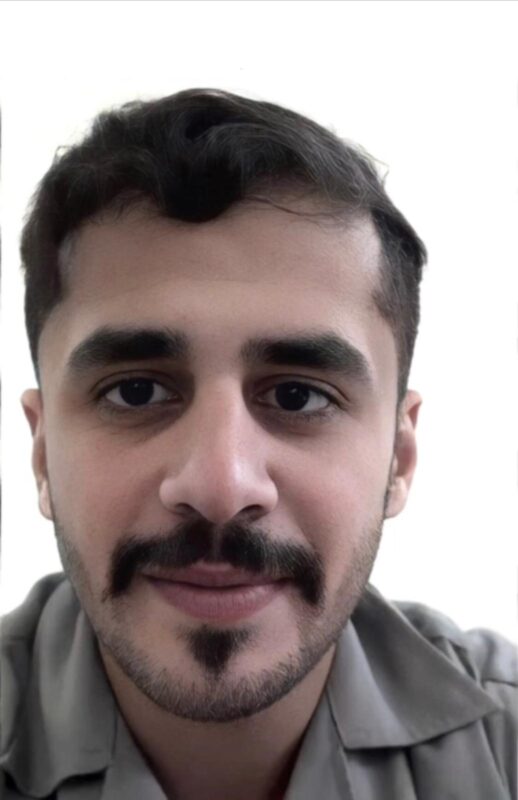Sayed Osama Ali Husain was a 16-year-old student when Bahraini authorities arbitrarily arrested him from the street without presenting an arrest warrant. During detention, he endured torture, denial of access to legal counsel, and an unfair trial based on confessions extracted under torture. He is currently serving a 22-year and 6-month sentence in Jau Prison on politically motivated charges.
On 5 March 2017, officers from the Ministry of Interior (MOI), riot police officers, security police officers, and Criminal Investigations Directorate (CID) officers arrested Sayed Osama on Al-Maared Street where he was going with his friend to have dinner at a restaurant located in a commercial area in the Bahraini capital, Manama. Subsequently, the officers transported Sayed Osama, simultaneously beating and torturing him, and raided the apartment where he had been hiding. They transferred him to the CID building afterward. Moreover, the parents were not aware that Sayed Osama was arrested at the time, whereas they found out the next day at dawn when they woke up to the news of the raid on the apartment. Approximately six hours after the arrest, they received a call from Sayed Osama stating that he was at the CID building, where he was detained for almost four days.
Before his arrest, Sayed Osama was being pursued on a daily basis for two years. Consequently, he was compelled to hide in an apartment and lived in difficult conditions, experiencing instability and insecurity. Furthermore, two years before his arrest, at the age of 14, Sayed Osama had been sentenced to two years in prison on charges of riots, illegal assembly, and the manufacture of usable and explosive devices. On the other hand, the family’s house received multiple summonses at different times without mentioning the charges or providing any reason.
At the CID building, officers repeatedly tortured Sayed Osama by beating him on various parts of his body during the entire interrogation period. They stripped him of his clothes and placed him in a very cold room for an extended period of time. He endured various other forms of torture but didn’t disclose all of them out of fear for the feelings of his parents. Due to the torture he endured, Sayed Osama has been suffering from various injuries. The interrogation lasted for about a week and was conducted without the presence of a lawyer. As a result of the threats and torture, he confessed before the Public Prosecution Office (PPO) to some of the charges against him.
On 19 March 2017, two weeks after his arrest, Sayed Osama was transferred to the Dry Dock Detention Center, where he was able to meet his family for the first time since his arrest. On 11 May 2017, he was transferred to the New Dry Dock Prison, designed for convicts under the age of 21.
Sayed Osama was not brought before a judge within 48 hours of his arrest, was not given adequate time and facilities to prepare for his trial, and wasn’t able to present evidence and challenge evidence presented against him. Furthermore, there was no lawyer present as neither the parents hired a lawyer nor did the court provide one.
The court convicted Sayed Osama between 27 March 2016 and 28 February 2019, in cases related to 1) illegal assembly and rioting, 2) manufacturing usable or explosive devices, 3) intentional damage to buildings or public property, 4) placing structures simulating forms of explosives, 5) manufacturing or trading in explosives or importing weapons, 6) importing or possessing explosives or rifles or pistols, 7) explosion or attempted explosion, 8) arson, 9) violation of the terms of the license to import explosives or their quantity, and 10) negligent destruction. He was sentenced to a total of 22 years and 6 months in prison. Sayed Osama appealed some of the rulings, but the court of appeal rejected all the appeals and upheld the verdicts.
Sayed Osama is still suffering from injuries resulting from the torture he was subjected to by the officers during his arrest and interrogation in 2017, and he is still being denied treatment and health care.
Sayed Osama’s warrantless arrest, torture, denial of attorney access, unfair trial, and medical negligence constitute violations of the Convention Against Torture and Other Cruel, Inhuman or Degrading Treatment or Punishment (CAT), the International Covenant on Civil and Political Rights (ICCPR), and the International Covenant on Economic, Social, and Cultural Rights (ICESCR), to which Bahrain is a party. Furthermore, the violations he endured as a minor contravene the Convention on the Rights of the Child (CRC), to which Bahrain is also a party.
As such, Americans for Democracy & Human Rights in Bahrain (ADHRB) calls on the Bahraini authorities to immediately and unconditionally release Sayed Osama. ADHRB also urges the Bahraini government to investigate allegations of arbitrary arrest, torture, denial of legal counsel, and medical negligence, and to hold the perpetrators accountable. ADHRB further advocates for the Bahraini government to provide compensation for the injuries he suffered due to torture and hold the perpetrators accountable. At the very least, ADHRB advocates for a fair retrial for Sayed Osama under the Restorative Justice Law for Children, leading to his release. Additionally, it urges the Jau Prison administration to immediately provide Sayed Osama with the necessary health care to address the injuries resulting from torture, holding it responsible for any additional deterioration in his health condition.





